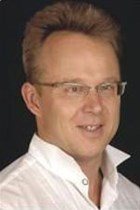
Top stories





EntrepreneurshipHow SMEs can build AI-ready businesses starting with the right technology foundation
Sudesh Pillay, WhyMAcForSME 23 minutes

More news























Logistics & Transport
Uganda plans new rail link to Tanzania for mineral export boost

When the Brazilian newspaper Folha de Sao Paolo announced that Bafana Bafana coach Carlos Alberto Parreira was set to resign his post, sources reportedly close to Parreira stated they weren't surprised that he wanted to go home, pointing out that he "spent a fortune" on phone calls to his family.
At Telkom's international tariff for peak time calls to Brazil at R.140 per minute, an hour-long conversation every day would cost Parreira R2604 a month. Surely, this cost can't be considered prohibitive at a monthly salary of R1.8 million. In fact, even a fortnightly weekend flight to his hometown Rio de Janeiro at a business fare of R34 937 would have paled in comparison to his monthly income statement.
So, what are the real reasons for Parreira's sudden departure? A few weeks ago, Sports and Recreation Minister Stofile made a call to contract top players exclusively to the national squad to avoid them “embarrassing” the country. Parliamentary chairman of the Sport and Recreation Committee Butana Komphela jumped on the bandwagon, labelling Bafana Bafana the biggest risk to hosting a successful 2010 FIFA World Cup and going on record to state that “Let's not beat about the bush: there is no team in South Africa. Our people are going to be clapping for other teams. I pity Parreira because he is going to fail. We are happy with the 2010 progress; the only thing we are not happy about is the team."
However, Parreira's job was not complicated only by the Government. After visiting his wife in Rio de Janeiro as she recovered from surgery, Parreira arrived back in SA to sniping from within the national soccer executive and from the clubs. Natasha Tsichlas, a member of SAFA's executive committee, said in his absence that Parreira spent too much time in his native Brazil.
When Parreira finally broke his silence, he blasted his adversaries: “It is nonsense. Please, mind your own business or shut up and think before you talk.” He added that his wife could not travel to SA for his birthday because she had had an operation - surely not an unreasonable request for a coach whose team gets together on average once a month.
In fact, the most conclusive proof for team performance not being a result of the head coach's physical presence was German coach Juergen Klinsmann, who spent the majority of his two-year stint at the helm of the German Football team at his home in Huntington Beach, California. Notwithstanding his being 10 000km away for three out of every four weeks, Klinsmann turned a losing team that had crashed out of the first round of the 2004 Euro into a championship team that won third place and was hailed by the fans as “Weltmeister der Herzen” (World Champions of the Hearts).
The second nail in Parreira's coffin has been the stony silence his suggestions about youth development were met with by soccer officials. In an interview with World Soccer late last year, Parreira lamented the fact that development had been neglected for too many years: “I think they have to organise things here much better, though, of course, it cannot be done overnight. If this country wants to get back to being one of the best sides in Africa, it is going to have to organise youth leagues... They do not have the under-15 and under-18 leagues you find in other countries.”
Asked what can be done in the short term, Parreira replied categorically, “It's too late for anything to be done to help me in preparing the national team for the World Cup. We are talking about a strategy for the next 10 years, with proper youth development. But I am afraid that unless something drastic happens then all the money coming into the game here will not be used effectively.”
For a coach, who took four national teams to World Cup finals and made Brazil the world champions in 1994, it must have been extremely frustrating to be constantly second guessed by the media and politicians alike. When interviewed about the nationalisation proposal, Parreira hit back, saying “I don't interfere in politics because I know nothing about it... It is one thing to talk about a bullfight but another thing to be in the arena facing the bull.” Add to that Parreira's statement shortly after taking office, when he said, “The moment I feel that I am not happy, I will say, ‘thank you very much, bye bye'”, as well as the exit clause that his contract provided for, and the picture becomes clear.
Analysts noted that the timing of Parreira's announcement was ominous in that it comes just weeks after Bafana Bafana's breakthrough victory over Paraguay for which the local media heaped praise on Parreira's tactics after months of negative barrage. This appears to indicate that Parreira's departure was long in the making and that he was looking for exiting at a high to safeguard his reputation as a World Cup winning coach.
All of the above goes to show that Parreira, despite being one of the highest paid world cup coaches ever, was never made to feel at home and that the constant attacks on his coaching integrity made him miss his family even more. Maybe we should take a leaf from this expensive lesson and practice making visitors feel at home rather than try to buy their happiness.
This would certainly align with the 2010 brand promise to "celebrate Africa's Humanity" and honour Madiba's call to action, who said shortly after the announcement of the 2010 host, "Few places in the world offer you that special hospitality for which South Africans have become famous. We invite you with open arms to our beautiful country."
